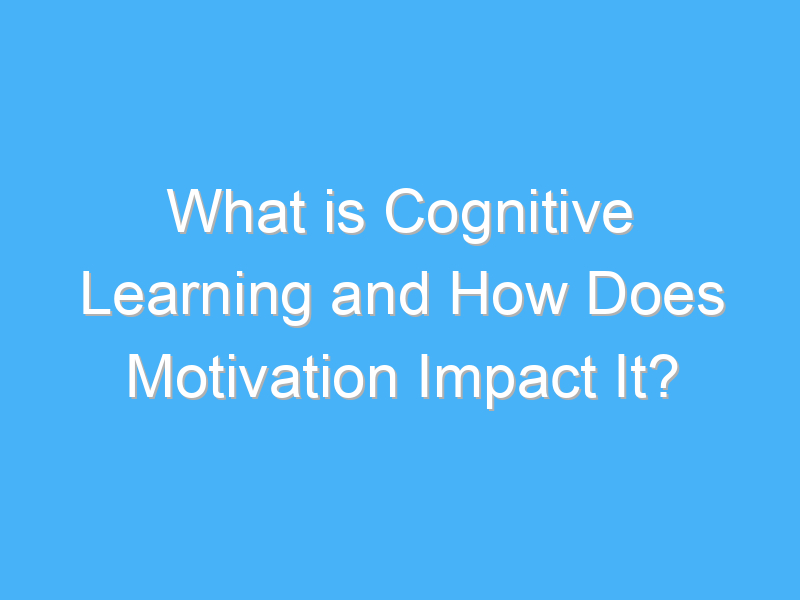
What is Cognitive Learning and How Does Motivation Impact It?
Cognitive learning refers to the process of acquiring knowledge and understanding through mental processes, such as perception, attention, memory, and problem-solving. It involves the active engagement of learners in thinking, analyzing, and making connections with prior knowledge. One crucial factor that significantly impacts cognitive learning is motivation. Motivation plays a vital role in shaping a learner’s engagement, effort, and persistence towards learning tasks. Whether intrinsic or extrinsic, motivation influences the extent to which learners explore and absorb new information, develop critical thinking skills, and apply knowledge to real-life situations. Hence, understanding the relationship between motivation and cognitive learning is essential in optimizing the learning process and enhancing educational outcomes.
Understanding Cognitive Learning
Cognitive learning refers to the process of acquiring knowledge, skills, and understanding through mental processes such as perception, attention, memory, and problem-solving. It involves the active engagement of learners in constructing meaning and making connections between new information and their existing knowledge. Unlike rote memorization, cognitive learning emphasizes critical thinking, reflection, and the application of knowledge in real-life situations.
Cognitive learning theories, such as those proposed by Jean Piaget and Lev Vygotsky, highlight the importance of learners’ active participation and the role of internal mental processes in learning. These theories emphasize that learning is not merely the absorption of information but rather a dynamic process that involves the organization and restructuring of knowledge.
The Role of Motivation in Cognitive Learning
Motivation plays a crucial role in cognitive learning as it influences learners’ engagement, effort, and persistence in the learning process. When learners are motivated, they are more likely to actively participate, seek out challenging tasks, and invest the necessary effort to understand and master new concepts. On the other hand, a lack of motivation can hinder cognitive learning by reducing learners’ interest, attention, and willingness to put in the required cognitive effort.
Motivation can be intrinsic, which comes from within the individual, or extrinsic, which arises from external factors such as rewards or punishments. Intrinsic motivation is often associated with a genuine interest in the subject matter, a sense of personal competence, and a desire to learn for the sake of learning itself. Extrinsic motivation, on the other hand, involves external incentives such as grades, praise, or tangible rewards.
Intrinsic Motivation and Cognitive Learning
Intrinsic motivation is considered to be particularly beneficial for cognitive learning. When individuals are intrinsically motivated, they engage in learning activities because they find them enjoyable, interesting, or personally meaningful. They are driven by an inherent curiosity and a desire to understand the world around them. Intrinsic motivation fosters deep learning, as learners are more likely to explore concepts in depth, make connections, and apply their knowledge to real-life situations.
Extrinsic Motivation and Cognitive Learning
While intrinsic motivation is highly desirable, extrinsic motivation can also play a role in cognitive learning. External rewards or incentives can serve as initial sparks to ignite learners’ interest and engagement. However, for extrinsic motivation to have a lasting impact on cognitive learning, it is essential to foster a sense of autonomy, competence, and relatedness. When learners perceive that they have control over their learning, feel competent in their abilities, and feel connected to others, extrinsic motivation can be effectively integrated with intrinsic motivation.
The Impact of Motivation on Cognitive Processes
Motivation not only influences learners’ engagement and effort but also impacts various cognitive processes involved in learning. Here are some ways in which motivation can impact cognitive learning:
Attention and Focus
Motivation plays a crucial role in directing learners’ attention and focus. When learners are motivated, they are more likely to attend to relevant information, filter out distractions, and sustain their focus on the task at hand. Motivation enhances learners’ ability to concentrate, process information efficiently, and extract meaningful patterns and relationships.
Memory Encoding and Retrieval
Motivation can influence learners’ memory processes, including encoding and retrieval. When learners are motivated, they are more likely to encode information effectively by actively organizing and connecting new knowledge with their existing mental frameworks. Motivated learners also exhibit better retrieval of stored information, as their enhanced attention and interest facilitate the retrieval process.
Problem-Solving and Critical Thinking
Motivation enhances learners’ problem-solving and critical thinking skills. Motivated individuals are more likely to approach complex problems with a positive mindset, persistence, and a willingness to explore alternative solutions. They are better able to apply their knowledge, analyze information critically, and generate creative solutions to challenging tasks.
Metacognition and Self-Regulation
Motivation influences learners’ metacognitive processes, which involve monitoring and regulating one’s own thinking and learning. Motivated learners are more likely to engage in metacognitive strategies such as setting goals, planning, monitoring progress, and evaluating their own performance. They have a greater awareness of their strengths and weaknesses, which enables them to adapt their learning strategies accordingly.
FAQs
What is cognitive learning?
Cognitive learning refers to the process of acquiring knowledge and understanding through mental processes such as perception, attention, memory, and problem-solving. It involves actively engaging with the information, analyzing it, and making connections with prior knowledge to construct meaning and develop cognitive skills. Cognitive learning focuses on the internal mental processes that occur when individuals learn new information or skills.
How does motivation impact cognitive learning?
Motivation plays a crucial role in cognitive learning as it determines the level of engagement, effort, and persistence in learning tasks. When individuals are motivated, they are more likely to be actively involved in the learning process, which enhances their ability to absorb and process information effectively. Motivation influences the attention and focus individuals invest in learning, as well as their ability to recall and apply the learned material. It also affects the adoption of effective learning strategies and problem-solving approaches. Ultimately, motivation positively impacts cognitive learning by fostering an enthusiastic and goal-oriented mindset that drives individuals to seek knowledge and improve their cognitive abilities.
